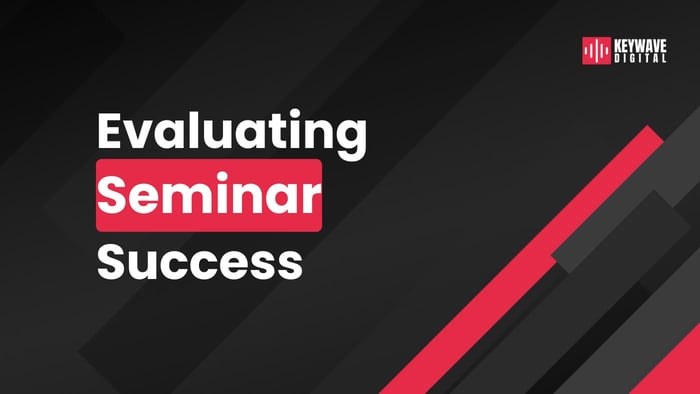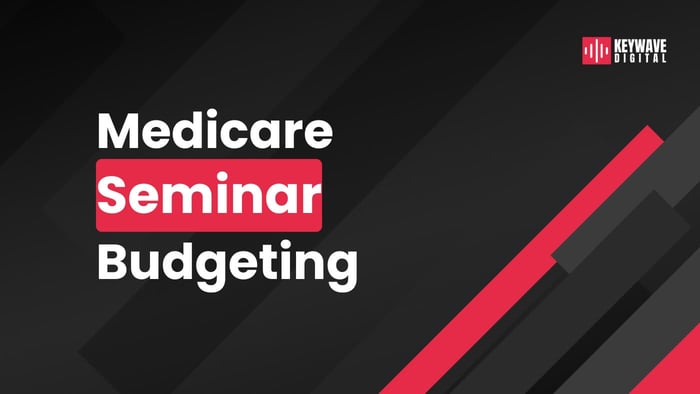
Ever wonder how to gauge if your seminar marketing is a slam dunk or a missed shot? Evaluating seminar marketing success can feel like navigating an uncharted jungle. However, it does not have to be so with the correct guidance.
Picture this: You've spent countless hours planning and executing your latest Medicare seminar. But as the dust settles, you're left asking yourself – was it all worth it?
Educational seminars can be a powerful marketing tool. However, it’s important to know how to evaluate seminar marketing success and optimize your marketing strategies going forward.
So, pack up your curiosity, and let’s get started!
Table Of Contents:
- Setting Achievable Marketing Goals for Your Seminar
- Key Metrics for Evaluating Seminar Marketing Success
- How to Analyze Key Metrics for Evaluating Seminar Marketing Success
- Tips and Best Practices for Evaluating Seminar Marketing Success
- Key Takeaway
Setting Achievable Marketing Goals for Your Seminar
The first step to your post-seminar assessment is reviewing the objectives you’ve set at the start of your seminar marketing campaign.
What do you want to achieve with this event? The common objectives of seminar marketing are to attract people to your event and book appointments.
Defining clear-cut marketing goals is pivotal in charting the path to success. These goals need not be overly ambitious; instead, focus on making them specific yet achievable.

A popular method employed by many marketers today is crafting objectives following the SMART criteria. Your seminar marketing goals should be specific, measurable, achievable, relevant, and time-bound.
- S: Be explicit about what you want to achieve.
- M: Quantify your objectives.
- A: Ensure that these aims are realistic, given available resources.
- R: Align these targets with broader organizational goals.
- T: Set timeframes within which these should be achieved.
An example of a seminar marketing goal could be: "Increase seminar registrations by 15% over the next quarter." It's clear, aligned with your overall business objectives, and attainable within a certain timeframe.
Keep in mind your goals aren't unchangeable. They can shift and grow with how your seminars perform.
After the event, you can evaluate whether you met your goals. If you did, it's a strong indicator of success. If not, you can identify improvement areas for future events.
Key Metrics for Evaluating Seminar Marketing Success

Assessing the success of a seminar marketing campaign involves measuring various key metrics to determine the effectiveness of your efforts. These metrics can help you understand how well your marketing strategies work and where improvements may be needed.
Here are some key metrics to consider for your seminar marketing efforts:
Number of Registration: How many people signed up for your financial seminar?
Attendance Rate: How many registrants actually attended the seminar?
Engagement Metrics: Did your website and social media pages gain more likes, shares, comments, and mentions related to your educational event?
Appointments Generated: How many attendees expressed interest in booking a one-on-one appointment post-seminar?
Conversion Rate: How many seminar attendees and prospects took the desired action and booked an appointment with you.
How to Analyze Key Metrics for Evaluating Seminar Marketing Success
If you're aiming for seminar marketing success, getting a handle on key metrics is essential. It's like the dashboard in your car – it tells you how fast you're going, how much gas is left, and when there might be an issue.
But your job doesn’t end with identifying key metrics. You should also know how to analyze them. Here's a guide on how to evaluate metrics for your future seminars:
Gather Data
First, you must collect all relevant data about your seminar marketing campaign. This includes registration numbers, attendance records, budget spent on advertisement, engagement metrics, and other data points.
Aside from quantitative data, you may collect feedback from attendees through post-seminar surveys or feedback forms.
Perform Benchmarking
Once you have the relevant data, compare your seminar's performance metrics to industry benchmarks and past seminar results. Benchmarking is the practice of comparing metrics and best practices within the industry.
Attendance rate is a straightforward way to evaluate your seminar’s success. Check attendance numbers against goals you’ve initially set to see if your seminar was a hit.
Educational seminars aim to have a bare minimum of 10 attendees per session. If you’ve reached this number, then your seminar marketing campaign can be considered a success.
Based on our hands-on experience working with agents, the sweet spot would be seminars with 15-20 attendees. Our recent Medicare seminar case study found that seminars in intimate settings convert more attendees. People are more involved, and the chances of booking appointments are higher.
Some agents prefer having 30 or even 40+ attendees in a single room for their seminars. It really comes down to your preference and what you're comfortable with. Different approaches work for different people, and adapting to what suits you best is essential.
Compare Lead Cost vs. Attendance Rate
Another method of measuring success is comparing costs versus attendance rates in your event.
On average, a lead ranges from $10 to $23 per RSVP, depending on the location you’re targeting and the offer you’re running (meal vs. no meal). That means you can expect someone to sign up for your seminar for every $10-$23 spent on Facebook ads.
Calculate how much you spent on promotions, then run a comparison against the number of registrations. This helps determine the efficiency of your marketing spend and compare the expenses incurred with the results achieved. Remember: make the most out of your advertising spend.
Tips and Best Practices for Evaluating Seminar Marketing Success
Follow these three simple tips and tricks to help you evaluate the success of your seminar marketing campaign:
Leverage Your RSVP Data
Understanding how to use and analyze RSVP data can make a substantial difference in your event's impact.
As RSVPs pour in, analyze the data and keep track of the sources driving the most registrations. Some factors that can affect RSVP numbers are the local demographics, population size, venue selection, and seminar timing.
You can measure success by comparing your RSVP numbers to your initial seminar objectives. This insight will help you allocate your resources effectively in future seminar marketing campaigns.
Based on the RSVP data and analysis, be prepared to adjust your seminar marketing strategy. But remember, success is not just about numbers but also about delivering value to your clients.
Incorporate Feedback Into Your Event Evaluation Process
Another way to measure the success of your educational seminar is to conduct a post-event survey.
Shortly after the seminar, launch a brief survey to capture the attendees' opinions. You may ask them about their overall experience, which can help you understand what worked well and what areas need improvement.
Gathering event feedback isn't just asking attendees what they thought about your event. It requires thoughtful questions aimed at understanding their experience fully.
High levels of customer satisfaction can lead to more one-on-one appointments. Think about it this way: happy attendees are likelier to book an appointment and recommend you to others. Consider sending seminar attendees a “thank you” card or email for even better results.
Repeat the Evaluation Process
As you conduct more seminars, repeat the analysis process for each one. All the valuable insights gained from your evaluation will allow you to refine your seminar marketing strategy.
Over time, it becomes easier to host a Medicare seminar or retirement-focused seminar once you have an optimized marketing plan.
Key Takeaway

That's a wrap on our journey through the maze of evaluating seminar marketing success.
We've dug into the importance of goal setting and key metrics like leads generated and conversion rate.
In this blog, we’ve also discussed how to analyze the key metrics and what best practices you can apply for assessing seminar marketing success.
The adventure doesn't stop here, though! Use this guide as your compass and watch your next event’s performance soar!
Ready to execute your seminar marketing campaign? Keywave Digital is here to assist you! Contact us today, and let's work together to make your seminars successful!






